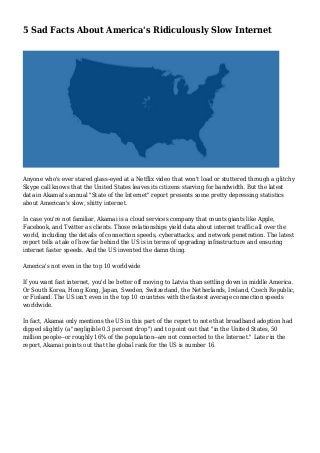
5 Sad Facts About America's Ridiculously Slow Internet
- 1. 5 Sad Facts About America's Ridiculously Slow Internet Anyone who's ever stared glass-eyed at a Netflix video that won't load or stuttered through a glitchy Skype call knows that the United States leaves its citizens starving for bandwidth. But the latest data in Akamai's annual "State of the Internet" report presents some pretty depressing statistics about American's slow, shitty internet. In case you're not familiar, Akamai is a cloud services company that counts giants like Apple, Facebook, and Twitter as clients. Those relationships yield data about internet traffic all over the world, including the details of connection speeds, cyberattacks, and network penetration. The latest report tells a tale of how far behind the US is in terms of upgrading infrastructure and ensuring internet faster speeds. And the US invented the damn thing. America's not even in the top 10 worldwide If you want fast internet, you'd be better off moving to Latvia than settling down in middle America. Or South Korea, Hong Kong, Japan, Sweden, Switzerland, the Netherlands, Ireland, Czech Republic, or Finland. The US isn't even in the top 10 countries with the fastest average connection speeds worldwide. In fact, Akamai only mentions the US in this part of the report to note that broadband adoption had dipped slightly (a "negligible 0.3 percent drop") and to point out that "in the United States, 50 million people--or roughly 16% of the population--are not connected to the Internet." Later in the report, Akamai points out that the global rank for the US is number 16.
- 2. The top slots this year, yet again, belong to Asia. South Korea's internet is probably the best in the world. It ranks at the top of every list, namely the list of countries with average broadband speeds above 10 Mbps. A rollicking 79 percent of South Koreans enjoy speeds of 10 Mbps or greater. The US didn't even make the list. Don't blame size A lot of people blame slow US internet speeds on the size of the country. The internet does demand a physical infrastructure to carry packets of data from one side of the nation to another, and in more isolated areas, that infrastructure is more sparse, making it tougher to offer high-speed connections. It means that the whole country's average speed gets brought down by these dead spots. But the data tells a different story. Ironically, some of the most remote states in the country enjoy some of the fastest internet speeds. Utah's internet is number six in the nation, followed by Washington, Oregon, and North Dakota. North Dakota! Meanwhile, Virginia is only slightly larger than South Korea, but its internet is almost 25 percent slower on average. US speeds are tragically far from "broadband"
- 3. Uncompetitive internet speeds is hardly news to US officials. Acknowledging the massive gaps in access to high-speed internet across the country, the Federal Communications Commission (FCC) recently redefined broadband in an effort to compel internet service providers to build faster networks. It used to be 4 Mbps. Now it's 25 Mbps. Guess what? Not a single state can boast anything close to widespread speeds greater than 25 Mbps. In fact, none of them can even claim full broadband coverage according to the old definition. So if you want to move to a state with pretty good internet, Delaware is the state for you. It's also a great place to incorporate a tech company. Mobile internet is even worse So all the above statistics refer to terrestrial broadband. Surely, the US must be better on the mobile front? Nope. Akamai's findings for the fastest mobile connections in the five major continental regions, ranked: Europe: United Kingdom, 16.0 Mbps Asia Pacific: Japan, 8.3 Mbps South America: Venezuela, 6.3 Mbps North America: United States, 3.2 Mbps
- 4. Africa: Morocco, 3.0 Mbps Venezuela's mobile internet speeds are almost twice those of the US. Venezuela is struggling to feed its citizens, but they can stream YouTube on their phones faster than the average American. America is home to a ton of hacker activity Nevertheless, the US is second only to China as the biggest exporter of attack traffic. This isn't necessarily related to speed, and it's hard to draw conclusions from Akamai's data about internet security. But one thing stands out: A sizable proportion of cyberattacks worldwide originate in the US. China accounts for 41 percent of global attack traffic, while the US accounts for just 13 percent. There's not really a third place. Taiwan and Russia are neck-and-neck with 4.4 percent and 3.2 percent, respectively. The report doesn't offer much detail about the attacks themselves, but the data doesn't lie. If you wanted to pick the top two belligerents in the ongoing global cyberwar, they would be China and the straggling United States. [Akamai] Contact the author at adam@gizmodo.com. Public PGP key PGP fingerprint: 91CF B387 7B38 148C DDD6 38D2 6CBC 1E46 1DBF 22 http://feeds.gawker.com/~r/gizmodo/full/~3/_eqDgtR6H8I/5-sad-facts-about-americas-ridiculously-sl ow-internet-1694843347